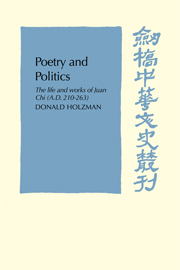Book contents
- Frontmatter
- Contents
- Dedication
- Preface
- Chinese Foreword by Jao Tsung-i
- List of Wei Emperors
- Introduction
- 1 The early Wei emperors
- 2 Tung-p'ing
- 3 Assassination and retreat
- 4 Anti-ritualism
- 5 Confucian essays and a strange understanding of Chuang-tzu
- 6 Society and solitude
- 7 The immortal woman
- 8 The pursuit of immortality
- 9 Mysticism
- 10 The Great Man
- 11 Poetry
- Conclusion
- Notes
- Bibliography
- Finding list
- Index
- Frontmatter
- Contents
- Dedication
- Preface
- Chinese Foreword by Jao Tsung-i
- List of Wei Emperors
- Introduction
- 1 The early Wei emperors
- 2 Tung-p'ing
- 3 Assassination and retreat
- 4 Anti-ritualism
- 5 Confucian essays and a strange understanding of Chuang-tzu
- 6 Society and solitude
- 7 The immortal woman
- 8 The pursuit of immortality
- 9 Mysticism
- 10 The Great Man
- 11 Poetry
- Conclusion
- Notes
- Bibliography
- Finding list
- Index
Summary
I began work on Juan Chi many years ago and submitted a thesis containing the translation of his pentameter poetry to Yale University as part of the requirement for a Ph.D. degree in 1953. I realize now how bold such an attempt was and how inaccurate my translation was bound to be. For Juan Chi is one of the most difficult of the great Chinese poets to understand in any depth. His vocabulary is relatively small, his grammar deceptively simple, but his meaning is frustratingly difficult to grasp. ‘We hear his words with our ears and see them with our eyes, but his emotions reach out beyond the confines of the universe’, as Chung Jung said in his famous appreciation of Juan Chi. This ‘reaching out’ is as exhilarating as the obscurity of much of the verse is frustrating, and, once intrigued, the reader is naturally stimulated to try to deepen his understanding of the poet and to dissipate his frustrations. This book is my attempt to do just that, to study Juan Chi in all his complexity, ignoring none of the contradictions or difficulties he presents. But if he is so obscure, if even the Chinese reader finds much of his poetry needs extended commentary, why attempt to present him to a Western audience? There are many reasons. In the first place, his poetry is, by any estimation, among the best ever written in China.
- Type
- Chapter
- Information
- Poetry and PoliticsThe Life and Works of Juan Chi, A.D. 210–263, pp. vii - viiiPublisher: Cambridge University PressPrint publication year: 1977

